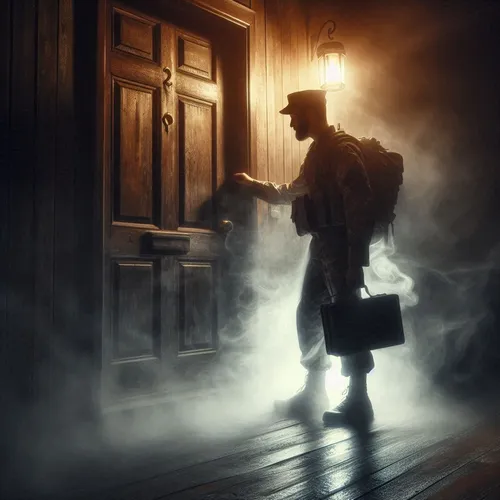The man she buried is back and knocking.
Margaret Whitmore pressed her trembling palm against the oak door, feeling each thunderous rap reverberate through her bones. Three years had passed since she'd lowered James's remains into the cold Massachusetts earth, three years since the telegram had arrived with news that his dismembered body had been recovered from a Japanese internment camp in the Philippines. Three years of sleepless nights and whispered prayers, of learning to live with the ghost of a love that war had stolen.
But ghosts didn't knock.
"Margaret." The voice beyond the door was unmistakably his—rough from cigarettes, softened by the accent he'd picked up during his childhood in Georgia. "Please, Maggie. I know you're in there."
Her legs nearly buckled. She'd buried him herself, stood in the rain as Father McKenzie spoke words that were supposed to bring peace. The casket had been so light—too light for a man who once lifted her off her feet with ease. The army had explained that decomposition in the tropical climate, combined with the brutality of his captivity, had left little to recover. She'd wept over bone fragments and a dog tag, accepting what remained of Lieutenant James Theodore Whitmore as all she would ever have of her fiancé.
"This isn't possible," she whispered to the empty hallway, her voice barely audible over the persistent knocking.
"I know how this must seem," James continued from the other side. "I know what they told you. But I'm here, Maggie. I came home."
Margaret's hand moved to the chain lock, then froze. She'd heard stories—veterans returning from the Pacific with minds fractured by what they'd endured, mistaking strangers for dead wives, seeing faces that no longer existed. Perhaps someone had found James's effects, learned enough about their life together to craft this cruel deception.
"Tell me something only James would know," she called out, her voice stronger now.
A pause stretched between them, filled only by the October wind rattling the windows of her small apartment above the bakery where she worked.
"You have a scar on your left shoulder blade," he said finally. "Shaped like a crescent moon. You got it when you were seven, falling from the apple tree behind your grandmother's house in Vermont. You told me the story our first night together, when I traced it with my finger and asked if it hurt."
Margaret's breath caught. She remembered that night—the way he'd been so gentle, so curious about every mark on her body, treating each one like a story worth knowing. Her hand moved to the lock of its own accord.
"And you have nightmares," James continued, his voice softer now, more desperate. "You talk in your sleep about fire. About the mill burning down when you were twelve. You wake up screaming sometimes, and I would hold you until the shaking stopped."
The chain clinked as she undid the lock. Her fingers fumbled with the deadbolt, muscle memory warring with disbelief. The door swung open, and there he stood.
James Whitmore looked exactly as she remembered—tall and lean, with dark hair that curled at the edges and eyes the color of storm clouds. He wore his army uniform, pressed and clean, the brass buttons gleaming in the hallway's dim light. Even his smile was the same, crooked on the left side, the one that had made her fall in love with him at a USO dance four years ago.
But something was wrong.
"You look..." she began, studying his face. "You look exactly the same."
"Prison camp food," he said with a weak laugh. "Keeps you thin."
She stepped back, allowing him into the apartment. He moved with the same careful grace she remembered, but his presence felt different somehow—lighter, as if he barely disturbed the air around him. When he reached for her, she noticed his hands cast no shadow in the lamplight.
"James, how is this possible? They showed me... I buried..."
"Mistaken identity," he said quickly. "It happens more than you'd think. The conditions over there, the heat, the humidity. Bodies decompose quickly. Dog tags get mixed up, switched around. I was in a different camp, Maggie. Took me this long to make it home."
She wanted to believe him. Every fiber of her being ached to accept this miracle, to fall into his arms and pretend the last three years of grief had been nothing more than a terrible nightmare. But doubt gnawed at her.
"Your letters stopped coming in June of 1942," she said. "The army said your unit was overrun near Bataan."
"I was captured. Moved from camp to camp. No way to write, no way to get word out." His explanations came too quickly, too rehearsed. "But I thought about you every day. Your face was what kept me alive."
Margaret studied him carefully. His uniform bore no signs of wear, no stains or tears that would suggest years of imprisonment. His body showed no evidence of malnutrition or abuse. Even his wedding ring—the simple gold band they'd chosen together before his deployment—gleamed as if freshly polished.
"Show me your hands," she said suddenly.
"What?"
"Your hands, James. Show me your hands."
He hesitated, then extended them palm-up. They were smooth, unmarked by calluses or scars. The James she'd known had working hands—rough from his job at the lumber mill, marked by small cuts and burns from his weekend carpentry projects.
"The camps weren't... I didn't do manual labor," he said, but his voice lacked conviction.
Margaret stepped closer, her heart hammering against her ribs. "Take off your ring."
"Maggie, what's this about?"
"Take it off."
With obvious reluctance, he twisted the gold band from his finger. Margaret's blood turned to ice water. The ring bore no inscription—but the one she'd given James was engraved with their initials and wedding date.
"Who are you?" she whispered.
The thing wearing James's face smiled sadly. "I'm sorry, Margaret. I truly am."
Before her eyes, his form began to shimmer and fade, like heat distortion rising from summer pavement. The uniform dissolved first, then his body, until only his face remained floating in the lamplight.
"I'm Thomas Brennan," the apparition said. "I died in the camp two beds down from James. He talked about you constantly—your laugh, your letters, the life you'd planned together. I listened to every story until I knew you as well as he did."
Margaret's legs gave out, and she collapsed into her reading chair.
"James died in my arms," Thomas continued, his voice growing fainter. "Dysentery took him in the spring of '43. His last words were about you—how he was sorry he'd never make it home for the wedding, how he wanted you to be happy, to find someone else to love."
"Why?" Margaret choked out. "Why would you do this to me?"
"Because I never had anyone," Thomas said. "No sweetheart, no family waiting. I died alone and forgotten, and I envied James so much that I... I couldn't let go. I've been trying to find my way here for years, drawn by the love he described, by stories of a woman who waited faithfully for a man who was already gone."
The face was almost transparent now, barely visible in the growing darkness.
"He wanted you to know he loved you until the very end," Thomas whispered. "And he wanted you to live, Margaret. To be happy. To stop waiting for dead men to come home."
Margaret wept then—for James, for Thomas, for all the young men who'd died far from home in places whose names she couldn't pronounce. She wept for three years of faithful mourning, for love letters she still kept in a shoebox beneath her bed, for the wedding dress that hung in her closet like a white ghost.
When she finally looked up, she was alone.
The next morning, Margaret walked to the town cemetery. She knelt beside James's headstone and placed a single white rose on the grass.
"I understand now," she whispered. "I'll try to let go. I'll try to live."
As she stood to leave, she felt a warm breeze touch her cheek—gentle as a kiss, final as goodbye. For the first time in three years, Margaret Whitmore walked toward the future instead of the past, carrying love with her but no longer buried beneath its weight.
The dead, she had learned, sometimes return not to haunt us, but to set us free.





This story has not been rated yet. Login to review this story.